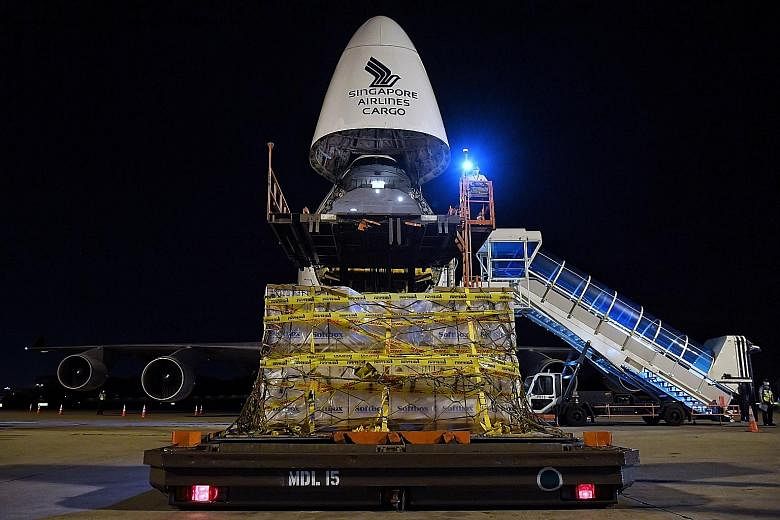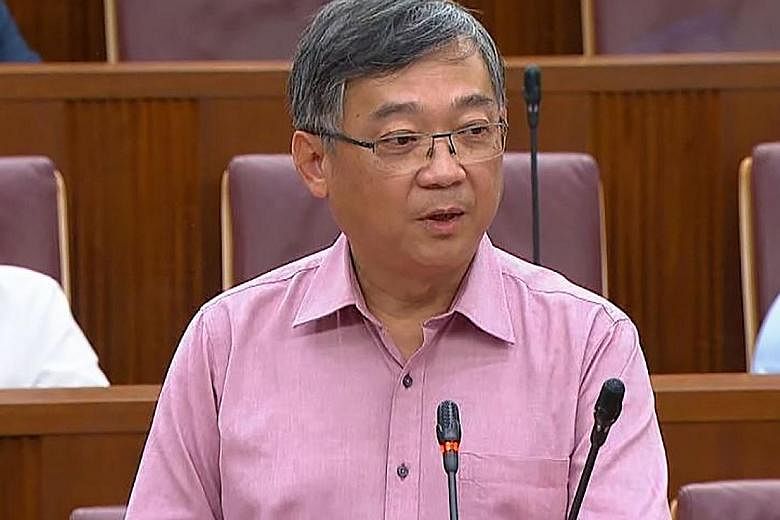More vaccines are expected to arrive in Singapore in the next few months, including those by American biotechnology firm Moderna and China's Sinovac, said Health Minister Gan Kim Yong yesterday.
The Republic received its first shipment of the Pfizer-BioNTech Covid-19 vaccine last month.
Mr Gan said in Parliament that there will be enough Covid-19 vaccines for everyone in Singapore by the third quarter of this year if all goes according to schedule.
"The vaccines will arrive in Singapore in batches, given high global demand, especially from countries with high rates of infection," he said.
Pharmaceutical companies will also need time to scale up vaccine production and distribution, Mr Gan added in his ministerial statement on the Covid-19 situation here.
The Pfizer-BioNTech vaccine is the first vaccine against the coronavirus that has been approved for use in Singapore.
The nation's vaccination drive is kicking off first with healthcare workers and staff in the healthcare sector as they work in the direct care of patients or in supporting roles, Mr Gan said.
Other front-line and essential personnel will also be prioritised for receiving the Covid-19 vaccine, he said.
These include swabbers hired by the Health Promotion Board, as well as staff working in government quarantine facilities, community care facilities, and dedicated stay-home notice facilities.
For example, 40 staff from the National Centre for Infectious Diseases were the first to receive doses of the Pfizer-BioNTech vaccine on Dec 30 last year, including Professor Leo Yee Sin, the centre's executive director.
Mr Gan added that the elderly and those at greater risk of severe disease from the coronavirus will be vaccinated from next month, beginning with seniors aged 70 and above.
Those in jobs or settings where the risk of a super-spreading event is high - such as the construction, marine and process sectors - including migrant workers, will also be prioritised.
"Thereafter, we will progressively broaden our vaccinations to include other Singaporeans and long-term residents who are medically eligible," the minister said.
Mr Gan added that as more vaccines are approved for use, Singapore will adjust its vaccination programme depending on vaccine supply and disease epidemiology.
He told the House that the Government had started planning for the Covid-19 vaccination programme "very early on", and that it has in place end-to-end processes to meet the cold-chain logistics requirements.
These include delivery and receipt of the doses at the airport, storage and transport to vaccination sites - so that the quality and efficacy of the vaccines are not compromised.
In response to Ms Foo Mee Har (West Coast GRC), who wanted to know how Singapore was mitigating the risk of non-delivery of vaccine orders, Mr Gan said Singapore is in close contact with the manufacturers that it has signed contracts with and that it is monitoring the delivery schedule.
"We are also looking forward to more vaccines being approved so we have alternatives," said Mr Gan.
He said diversification of vaccine sources will ensure that Singapore has access to other supplies, even if one shipment is delayed.
"This way, we ensure that we have adequate vaccine supplies for the whole of Singapore," he added.



